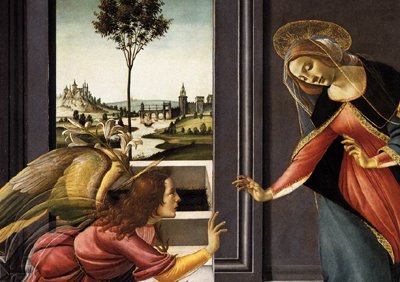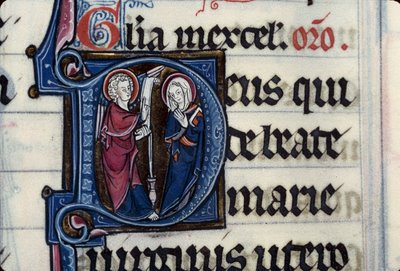
Final Day - Et habitavit in nobis ("And dwelt among us"). Et ingressus angelus ad eam dixit: Ave gratia plena, Dominus tecum, benedicta tu in mulieribus. (St. Luke, i, 28: "And the angel being come in, said unto her: Hail, full of grace, the Lord is with thee: blessed art thou among women.") Et Verbum caro factum est, et habitavit in nobis: et vidimus gloriam ejus, gloriam quasi unigeniti a Patre plenum gratiæ et veritatis. (St. John, i, 14: "And the Word was made flesh, and dwelt among us, and we saw his glory, the glory as it were of the only begotten of the Father, full of grace and truth.")
He saw the reasonable race, the race of men that, like Himself, expressed the Father's Mind, wasting out of existence, and death reigning over all in corruption. He saw that corruption held us all the closer, because it was the penalty for the Transgression; He saw, too, how unthinkable it would be for the law to be repealed before it was fulfilled.

He saw how unseemly it was that the very things of which He Himself was the Artificer should be disappearing. He saw how the surpassing wickedness of men was mounting up against them; He saw also their universal liability to death. All this He saw and, pitying our race, moved with compassion for our limitation, unable to endure that death should have the mastery, rather than that His creatures should perish and the work of His Father for us men come to nought, He took to Himself a body, a human body even as our own.

Nor did He will merely to become embodied or merely to appear; had that been so, He could have revealed His divine majesty in some other and better way. No, He took our body, and not only so, but He took it directly from a spotless, stainless virgin, without the agency of human father—a pure body, untainted by intercourse with man. He, the Mighty One, the Artificer of all, Himself prepared this body in the virgin as a temple for Himself, and took it for His very own, as the instrument through which He was known and in which He dwelt.
Saint Athanasius, On the Incarnation


Collect of the feast: Deus, qui de beatæ Mariæ Virginis utero [the 14th-century Missal fragment ends here] Verbum tuum, Angelo nuntiante, carnem suscipere voluisti: præsta supplicibus tuis; ut, qui vere eam Genitricem Dei credimus, ejus apud te intercessionibus adjuvemur. Per eumdem Dominum... ("O God, who didst will that Thy Word should take flesh, at the message of an Angel, in the womb of the Blessed Virgin Mary, grant to Thy suppliant people, that we who believe her to be truly the Mother of God, may be helped by her intercession with Thee. Through the same Lord...")